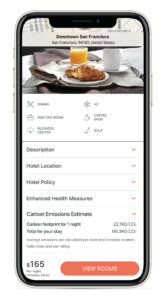B2B travel management platform CWT recently launched a point-of-sale carbon footprint indicator for its myCWT mobile and web app, as part of the company’s $100 million investment in its myCWT platform.
“We surveyed our global customer base at the end of 2021, and an overwhelming 87% expressed that they would like information provided to their employees at point-of-booking to help reinforce responsible travel choices,” said Erik Magnuson, vice president of product management, travel content and connectivity for CWT. “CWT’s new carbon footprint indicators will help customers and their travelers understand their corporate and personal travel footprints and reduce their impact on the environment.”

Alongside flight and hotel stay information, this CO2 indicator will let travelers know how much carbon they’ve produced from each activity. This service by CWT is in collaboration with carbon intelligence platform Thrust Carbon. This company also offers other features, like letting employers buy and sell carbon offsets along with flight purchases, such as donating to the reforestation of a forest around the globe or the purchase of solar panels for a school.
Read More: Hotels Are Zero-ing Their Game
Carbon Footprints and Big Business
Efforts to reduce our collective carbon footprint is by no means new, but it has been driven to the forefront in the last few years, as a response to climate change concerns.
Mark Corbett, founder and director of Thrust Carbon, believes that if travelers aren’t able to see their emissions when making transactions, it won’t factor in their decision-making. “We are rapidly moving to a world where emissions data will be valued side by side with financial data. Together with our partners at CWT, we have made a giant leap towards delivering this for business travelers around the world,” he said.
It’s hard to quantify the number of travelers tracking their emissions but various hotels brands and other travel-related companies have taken heed. In 2016, Dallas Fort Worth International Airport (DFW) was the first airport in North America to become carbon neutral, at the time it was one of only 23 airports, most of which were in Europe.
Since then, that number has reached more than 50, the bulk of which remains in Europe, including Hamburg Airport in Germany, Gatwick Airport in London and Austin-Bergstrom International Airport in Texas, which became carbon-neutral in 2021, only one of four in North America. In a resolution by Airports Council International (ACI) Europe and its members, more than 100 European airports have committed to going carbon neutral by 2030, as part of the Net Zero by 2050 pledge.
Marriott International also committed itself to net zero by 2050, as well. MGM Resorts International hasn’t gone quite as far, but the launch of a 100-megawatt solar array in the Nevada desert, which has enough power to produce up to 90 percent of MGM Resorts’ Las Vegas daytime needs and power roughly 27,000 U.S. homes, is a step in the right direction.
Read More: Healthy World: Walking the Talk
Companies at a Crossroads
What exactly should the next step be? On one hand, there is the vital nature of the face-to-face meeting; on the other, the ever-increasing carbon footprint that is its by-product. Eric Friedrichsen, CEO of travel and expense management company Emburse, said employee travel is one of the world’s greatest contributors of emissions, in a 2021 article by World Economic Forum.
In a study by Emburse, it was found that only a quarter of organizations considered their carbon footprint a priority; the top three were duty of care, cost control and employee satisfaction. And while six of out 10 companies reported having a sustainability policy, only three out of 10 had a policy that included business travel.
He goes as far as to say simply measuring one’s carbon footprint is not enough, encouraging companies to focus on behavioral changes “that would have a real impact.” According to the Emburse study, only a quarter of companies rolled out any other initiative, including behavioral-related changes. These types of initiatives would include things like encouraging more sustainable transportation or accommodation, or even incentivizing employees to choose from these options.
He concluded the reason for this is that companies simply find it too hard and too expensive to implement these changes.
Overhauling the way in which a company operates and approaches business travel isn’t easy but CWT’s global survey shows that more employers want to do their part.




